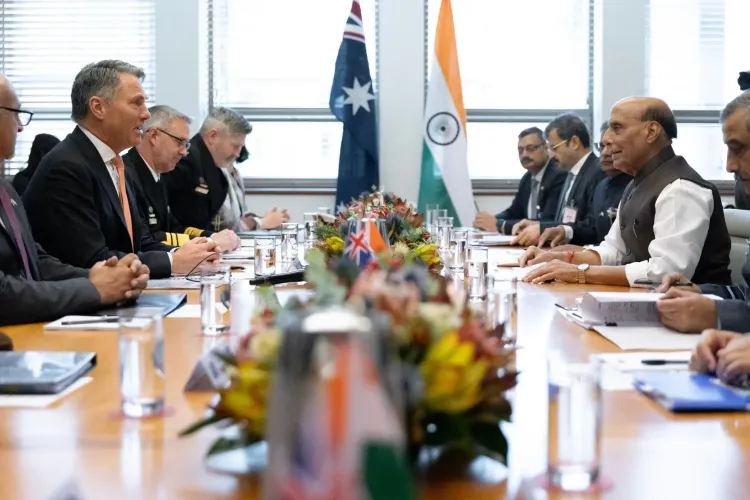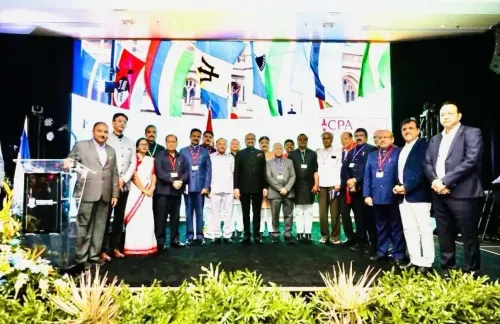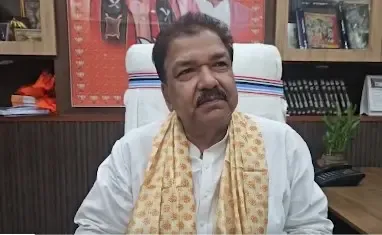How Are India and Australia Strengthening Their Defence Partnership?

Synopsis
Key Takeaways
- Enhanced Strategic Dialogue: Emphasis on strengthening discussions between operational commands.
- Joint Maritime Security Collaboration: Roadmap established to bolster maritime cooperation.
- Submarine Rescue MOU: Progress in signing a mutual support agreement.
- Annual Defence Ministers' Dialogue: Commitment to regular consultations for defence architecture.
- Regional Cooperation: Focus on maintaining a peaceful Indo-Pacific through collaboration with partners.
Canberra, Oct 9 (NationPress) The esteemed security allies India and Australia engaged in discussions on Thursday regarding the next steps to strengthen their defence partnership. This included enhancing strategic dialogue and increasing the complexity of military exercises during the Australia–India Defence Ministers' Dialogue held at Parliament House in Canberra.
Defence Minister Rajnath Singh received a warm welcome from Australian Deputy Prime Minister and Minister for Defence, Richard Marles, during the inaugural session of the dialogue, which signifies unprecedented advancements in the bilateral defence alliance between the two nations.
In his opening remarks, Marles stated, "This marks the first visit of an Indian Defence Minister to Australia in twelve years, and we are thrilled to have you here today." He emphasized, "We will enhance talks between our operational commands, share more information, and work towards signing an MOU on submarine rescue. These initiatives will elevate our high-level strategic alignment to a much deeper operational level."
Defence Minister Rajnath Singh echoed similar sentiments, highlighting the significant progress made in defence cooperation across various domains, aligning with the overall enhancement of bilateral relations. He declared, "Our relationship is built on shared values of freedom, mutual respect, and a commitment to regional peace. We have also strengthened ties in defence technology, co-development, and industrial collaboration, unlocking opportunities for Australian firms under India’s Atmanirbhar Bharat initiative."
Singh noted the timeliness of the meeting amidst ongoing global conflicts and the challenges posed by cross-border terrorism. He reaffirmed India's commitment to pursuing peaceful solutions while safeguarding sovereignty and expressed gratitude for Australia's steadfast support regarding India's security interests.
The dialogue underscored both leaders' commitment to further enhancing cooperation, building on the four bilateral meetings since the elevation of the Australia–India Comprehensive Strategic Partnership in 2020.
The ministers advanced their prime ministers' vision for collaboration aimed at enhancing collective strength, contributing to mutual security, and fostering regional peace. They discussed a Joint Maritime Security Collaboration Roadmap and anticipated the renewal of the Joint Declaration on Defence and Security Cooperation by their prime ministers.
The ministers committed to expanding the bilateral defence architecture and enhancing consultations through an annual Defence Ministers' Dialogue.
They welcomed the signing of the Australia–India Implementing Arrangement on Mutual Submarine Rescue Support and progress towards operationalizing the Implementing Arrangement on Air-to-Air Refuelling, signed in 2024. Closer cooperation on information sharing was also highlighted.
Both leaders welcomed the establishment of Joint Staff Talks as a platform to progress joint exercises, operations, and interoperability across all domains. The Australian side expressed enthusiasm for India's participation in Exercise Talisman Sabre in 2025 and looked forward to India's involvement in 2027.
The ministers also acknowledged the importance of collaborating with regional partners to maintain a free, open, peaceful, stable, and prosperous Indo-Pacific. They reaffirmed strong support for freedom of navigation and overflight, unimpeded trade, and lawful uses of the sea in accordance with international law, particularly the 1982 United Nations Convention on the Law of the Sea (UNCLOS).
Additionally, the leaders appreciated the ongoing progress in defence cooperation among Australia, India, Japan, and the United States, emphasizing the growing strategic convergence among these partners. They reiterated their commitment to enhancing collaboration on maritime domain awareness and looked forward to a second collaborative activity during Exercise Malabar in November 2025.
Australia and India expressed strong support for initiatives that promote closer maritime surveillance cooperation among the four partners and welcomed the opportunity to observe the India–United States air exercise Cope India in 2025 alongside Japan.
Furthermore, Australian Defence Minister Marles accepted Singh's invitation to visit India for the Annual Defence Ministers' Dialogue in 2026.









